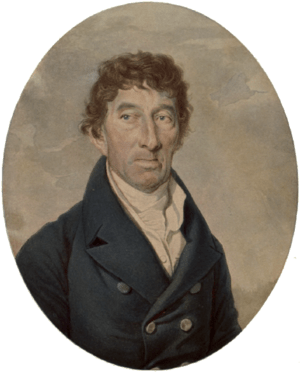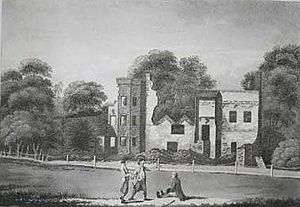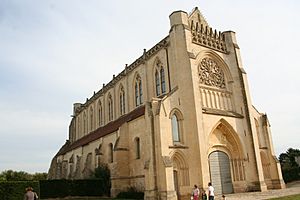William Russell (merchant) facts for kids
Quick facts for kids
William Russell
|
|
|---|---|

Water colour of Russell
|
|
| Born | 11 November 1740 |
| Died | 26 January 1818 (aged 77) Upton-upon-Severn, England
|
William Russell (born November 11, 1740 – died January 26, 1818) was an important businessman from Birmingham, England. He was a Unitarian, which is a type of Christian faith. He was also a close friend and supporter of Joseph Priestley, a famous scientist and theologian. William Russell worked hard to promote his Christian beliefs and fought for the rights of Dissenters, who were Protestants who did not follow the official Church of England.
Contents
William Russell's Life
William Russell was the oldest of three brothers. His family had a long history in business, starting with his great-grandfather who was an ironmaster. His grandfather expanded the family business to North America, dealing with iron mines and factories. William's father started new businesses in thread-making and animal skins, which William later took over.
In 1762, William married Martha Twamley. He invested in a leather business and later started a shipping company called Respondentia. This company was very successful, making a lot of money in its first year. He also partnered with John Finch to trade textiles and metals with countries like Sweden, Holland, and Russia.
William and Martha had five children, but two of them, Jane and Frances, died young. Sadly, William's wife, Martha, died in a coach accident in 1790. The Russell family lived comfortably in a farmhouse at Showell Green, near Birmingham. William was interested in raising animals and even wrote letters about it to George Washington, who became America's first president.
As a respected citizen of Birmingham, William Russell was often asked for his advice and help. He supported the town's Hospital and the Birmingham Humane Society. He also became a Justice of the Peace, helping to keep law and order in his area.
Helping Others: Philanthropy
William Russell was known for his kindness and generosity. He always tried to help people in need without seeking attention. He believed it was more important to be good than to look good.
- He paid for poor children to be taught how to read and write.
- He hired a local doctor to care for poor families in his neighborhood.
- He helped provide food for the poorest people around him.
- Many families, especially those who lost their homes in fires or were sick, received his help.
- During the American War for Independence, he bought food, clothes, and shoes for American prisoners of war.
His neighbors, even those who were poor and uneducated, showed how much they cared for him. When his house was attacked during the 1791 Birmingham riots, they tried to protect his home and calm the rioters.
Thoughts on Education
William Russell believed that education was very important. He supported many schools and learning opportunities:
- He paid local church leaders to teach poor boys to read and write.
- He helped support the Birmingham Library and a special Scientific Library.
- He sponsored talks about science.
- He supported schools in different towns and colleges like Warrington Academy and the New College at Hackney.
- He also supported many Sunday Schools, which taught children on Sundays.
- Like his father and grandfather, he was a governor of King Edward's School, Birmingham.
In 1790, he supported Joseph Priestley's idea for a Birmingham Sunday Society. This society taught older children who had already attended Sunday school. They learned subjects like math, bookkeeping, geography, and drawing, along with religious lessons.
William Russell was a major supporter of the Unitarian New Meeting church in Birmingham. He also supported many other Unitarian churches and ministers across the country. He worked closely with Joseph Priestley to spread their ideas about Christianity. He even paid for several editions of Priestley's book, Appeal, which explained their beliefs.
Russell was upset by how Anglican ministers treated Dissenting clergy. He defended Priestley when Anglican clergy caused problems for him, especially during arguments about the Birmingham Library and the campaign to change the Test Acts.
Fighting for Rights: Test and Corporation Acts
William Russell was very passionate about political freedom. He strongly supported the movement to repeal, or cancel, the Test and Corporation Acts. These laws were meant to limit public jobs to only members of the Church of England. Dissenters felt these laws were unfair.
Russell wrote to important politicians, explaining that Dissenters only wanted equal civil rights. He said, "We are not attacking the rights of others, but merely endeavouring to recover our own."
He believed that Dissenters would be stronger if they worked together. He helped create the Committee of the Seven Congregations of the Three Denominations of Dissenters in Birmingham, and he was its chairman. This committee published books about religious freedom, which Russell helped to edit.
Uniting Protestants
Russell wanted to unite all Protestant Dissenters across England. He suggested a plan where local groups would send representatives to bigger meetings, eventually leading to a national meeting in London. Even though the London Dissenting Deputies first said no, Russell's strong efforts led to a national meeting in 1790.

The Birmingham Committee, led by Russell, wanted all laws against Dissenters to be removed, even those against non-Trinitarians (like Unitarians). Russell organized a meeting in Leicester that also called for the removal of all these laws.
After the Test Acts were not repealed, Russell and Priestley believed that changing Parliament itself was the best way to achieve equal rights. Russell planned to start a Warwickshire Constitutional Society. However, this plan was stopped because of growing anger in Birmingham. The dinner planned for the society's launch was followed by the terrible Priestley Riots in 1791, where Russell's house was destroyed along with Priestley's.
Russell went to London for safety and met with the Prime Minister, William Pitt the Younger. He returned to Birmingham but found the town too divided. So, in 1794, he decided to move with his three children to America.
Moving to America
The Russell family sailed to America in August 1794. However, their ship was stopped by a French warship, and they were forced to go to France. After several months in Paris, they finally sailed to America in July 1795, arriving in New York in August.
They settled in Philadelphia. Joseph Priestley stayed with them the next spring. During this time, a group of English people living in America met with Priestley to plan a Unitarian society. William Russell was one of the twenty-one founding members of The Society of Unitarian Christians in Philadelphia, which was the first Unitarian church in the New World. He even served as their treasurer for a while.
Returning to France
In 1797, relations between America and France became difficult. This made things hard for people like Russell and Priestley who were thought to support France. In 1801, Russell decided to leave America, planning to spend a month in France before going back to England. He and Priestley had hoped to start a Unitarian church in Paris, but Priestley decided to stay in America.
When Russell arrived in Paris, the French government was making agreements with the Vatican, so it was not a good time for Protestants to start new churches. Russell was advised to wait. Instead, he formed a group to translate and publish books about Rational Christianity. But even this was stopped.
To make things worse, Russell was warned that he would be arrested if he returned to England. He had technically bought property in France, the Ardenne Abbey, during a time when Britain and France were at war. Because of this, and his past efforts to unite Dissenters, he couldn't expect special treatment. So, in August 1801, Russell decided to live on his estate in Normandy, France.
There, he wrote letters in French to explain his ideas about Rational Christianity. He wanted people to read the Bible and choose genuine Christianity over old superstitions. He also helped finance French translations of Joseph Priestley's books.
Russell worked hard to establish a Unitarian church in Caen, near his home. He repaired and furnished a small church on his property, and the first service was held there in October 1801. It was the first Protestant church to open in France since the French Revolution! The church quickly became full of people. In 1803, the congregation moved to a larger chapel in Caen, and Russell continued to support it financially.
Catholic priests often asked him for help for the poor and suffering, and he always helped generously. He wrote, "I love all mankind, and I see no reason why diversity of opinion should alienate one man from another." His help to the poor, especially during winter food shortages, earned him the nickname le père des pauvres (the father of the poor). His kindness to the people of Normandy continued even after he returned to England. In 1807, he became a French citizen.
After Napoleon Bonaparte was defeated, William Russell was able to return to England at the end of 1814. He spent his last few years at his son-in-law's home near Upton-upon-Severn. He wrote religious speeches and hymns, some of which were published after he died in 1818. He was buried next to his wife in St Philip's Church, Birmingham.
 | Jewel Prestage |
 | Ella Baker |
 | Fannie Lou Hamer |


